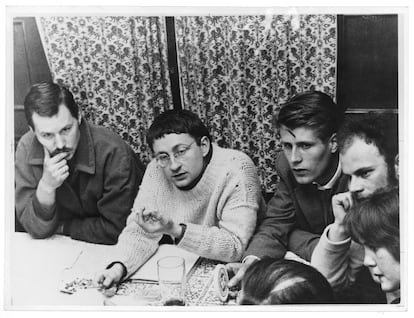Guy Debord, the French Marxist theorist who dissected the ‘Society of the Spectacle’
Philosopher Anselm Jappe’s reissued biography breathes new life into the influential former leader of the Situationist International


If Guy Debord (1931-1994) emerged from his grave and saw a world consumed by the internet, he would think, as he always did, that he had hit the nail on the head. “The Spectacle,” he wrote, “is not a set of images but the relationships between people mediated by images.” That’s Instagram – but the Spectacle is much more.
The implacable critic of the Society of the Spectacle (1967) and pugnacious leader of the Situationist International (founded in 1957) described a society that had no inkling or expectation of anything like the internet. But the society he lived in was certainly not devoid of advertising, consumerism and mass media. Debord described a society where people lived disconnected from their own lives, mere spectators rather than active participants in a commercialized world. It was a life that lacked authenticity and needed to be challenged.

Guy Debord, the canonical biography by Anselm Jappe about the work and legacy of the French philosopher, has recently been reissued in Spanish by Pepitas de Calabaza publishers. Debord, who in his lifetime attracted more attention from the police than from academics, was a brilliant and radical figure who took his own life in 1994. Since then, his legacy has been diluted, trivialized even, by certain comparisons with social networks. According to Jappe, this is the most effective way to discredit Debord.
Jappe argues that “the society of the spectacle” has become a trendy term, often used without any true understanding of its origins and meaning. The “spectacle” encompasses more than just media power, the ubiquity of social media or talk show sensationalism. It’s a broader concept that refers to people passively observing others who make decisions that affect their own lives. This occurs not only in consumerism, where material possessions replace real experiences, but also in politics, religion and art, where representation replaces a lived reality.
The Situationist International
Situationist theory represented an attempt to synthesize libertarian Marxism and the avant-garde art movements of the early 20th century, particularly Dada and Surrealism, into a modern and comprehensive critique of mid-20th century advanced capitalism. Hence the Situationist International’s social revolutionaries appreciation for playfulness, humor, artistic interpretation, urban life, leisure, the rejection of excessive work, and the desire for art to be seamlessly woven into everyday existence. In fact, many of its members came from the world of art and culture – Asgern Jorn, Constant Nieuwenhuys, Giuseppe Pinot-Gallizio, Michelle Bernstein and Raoul Vaneigem. Perhaps the most representative essay of the Situationist ethos is Vanegeim’s The Revolution of Everyday Life. As the title indicates, the Situationists accepted Marx’s mission to transform the world and combined it with Rimbaud’s mission to transform life.
Sadie Plant wrote the first major study of the Situationist International – The Most Radical Gesture: The Situationist International in a Postmodern Age (Routledge, 1992). She argued that the Situationists believed alienation had permeated every aspect of life: people had become isolated and disconnected, not just in terms of the things they make and use, but also in relation to their own experiences, emotions, creativity and desires. Interestingly, all this occurred during a prosperous period of capitalism – the dominance of social democracy and the establishment of the European Welfare State. Economic growth was steady and social inequalities diminished noticeably. However, the Situationists remain unimpressed by the system’s apparent accomplishments. “Everyone knows that gas heating won’t make you feel more at home, perfumes don’t bring eternal happiness, and vacations don’t make anyone’s dreams come true,” Plant writes.
Situationism aimed to “construct situations” – moments of creative liberation in daily life. Techniques like psychogeographic drift (wandering the city to observe its impact) and détournement (altering existing cultural elements) were characteristic of the movement. These techniques challenged and subverted the dominant culture, a strategy now seen in social media’s aggressive political discussions and in memes.

When Debord published The Society of the Spectacle in 1967, he wanted to offer (in a somewhat cryptic and sententious style) a situationist theoretical corpus for the “troubles” to come. These troubles came a year later in the form of the Paris riots when the Situationist ideology surged and permeated many of the era’s best-known rebellious slogans. The analysis of alienation and its influence on society (including the counterculture, Italian autonomism and punk) is still an important exercise. Punk pioneer Malcolm McLaren, the Sex Pistols’ manager in the late 1970s, was influenced by Situationist ideas.
Then came a plot twist – ideas of imagination, creativity and autonomy from the 1960s were distorted by neoliberal capitalism. Now they’re used in advertising and calls for entrepreneurial creativity and disruption. Criticism of the system became the system itself, revealing capitalism’s ability to absorb dissent.
Debord also captured the interest of authors from diverse ideological backgrounds. For example, Nobel Prize-winner Mario Vargas Llosa, known for his liberal convictions, drew inspiration from Debord’s ideas in his essay, “The Civilization of the Spectacle.” Vargas Llosa recognized the convergence of their thoughts, particularly regarding the notion that replacing genuine experiences with mere representations results in a loss of human essence.
In Spain, there was a significant Situationist wave in the 1990s that emerged during the anti-globalization movement, with its innovative approaches to rebellion. Luis Navarro, creator of the Hispanic Situationist Archive and founder of the Literatura Gris publishing house, says that Situationist ideas were circulated clandestinely through copies and pirated editions. These ideas inspired and influenced the autonomism and “okupation” movements that thrived during those years. The impact of Situationism declined after the September 11 attacks in 2001, but the ideology has not faded away completely. “Debord’s rhetoric has aged well, like the wines he often enjoyed,” said Navarro.
The Debord Myth
Guy Debord, a small man who wore glasses, became a legendary figure by passionately and unwaveringly dedicating his life to revolution. He fearlessly expelled members from the Situationist International and embraced a reputation as an unapologetic drinker. “Neither I nor the people who drink with me have ever felt ashamed of our excesses,” he wrote.
“He never made public appearances, had no official positions and was difficult to reach. He expressed himself through his own media, like his books and the Situationist International magazine. He fought against the ‘spectacle’ without flamboyance,” says Jappe. Debord denounced the commercialism of society for blocking access to “real life” and claimed to have lived his own life as an adventure and a work of art. “Debord was a good person but had a temper and a strong conscience, which made him difficult to get along with,” said Navarro. “His myth is part of modern art’s romantic tradition, carefully woven through his writings, ambiguities and eventual suicide.”
A few years before he died, Debord wrote with his usual self-confidence, “I have no doubt that my theories will endure well beyond the end of the century. The reason is simple – I understand the things that make up the spectacle.”
Sign up for our weekly newsletter to get more English-language news coverage from EL PAÍS USA Edition
Tu suscripción se está usando en otro dispositivo
¿Quieres añadir otro usuario a tu suscripción?
Si continúas leyendo en este dispositivo, no se podrá leer en el otro.
FlechaTu suscripción se está usando en otro dispositivo y solo puedes acceder a EL PAÍS desde un dispositivo a la vez.
Si quieres compartir tu cuenta, cambia tu suscripción a la modalidad Premium, así podrás añadir otro usuario. Cada uno accederá con su propia cuenta de email, lo que os permitirá personalizar vuestra experiencia en EL PAÍS.
¿Tienes una suscripción de empresa? Accede aquí para contratar más cuentas.
En el caso de no saber quién está usando tu cuenta, te recomendamos cambiar tu contraseña aquí.
Si decides continuar compartiendo tu cuenta, este mensaje se mostrará en tu dispositivo y en el de la otra persona que está usando tu cuenta de forma indefinida, afectando a tu experiencia de lectura. Puedes consultar aquí los términos y condiciones de la suscripción digital.








































